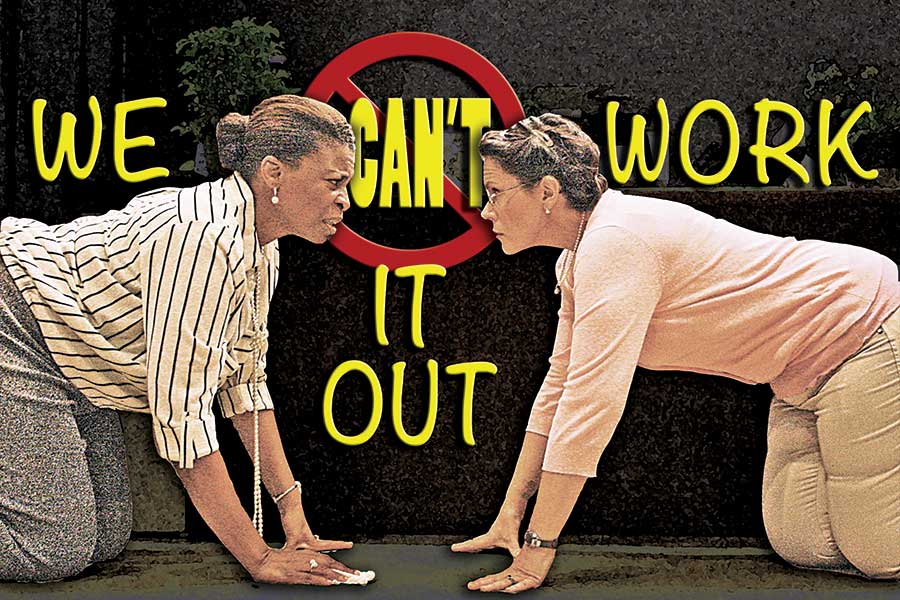Racial tension and inter-office politics collide at Allens Lane Arts Center when the critically acclaimed dark comedy and Off-Broadway hit “Rasheeda Speaking” makes its Philadelphia premiere Nov. 17-Dec. 3.
Written by Joel Drake Johnson, the comedic workplace thriller follows the drama between two middle-aged coworkers — one black (Jaclyn), one white (Ileen) — who are played against each other by the machinations of their boss, kicking off a power struggle that spins out of control.
Out director Scott R. Grumling said the play’s timely theme is among the reasons he wanted to bring it to Philadelphia.
“The subject matter is very relevant in our world today. It does deal with issues of racism but I think what’s great about it is that it deals with those issues in a way where it doesn’t really assign blame to anybody,” he said. “So whatever the audience brings in from their backgrounds and their perceptions about race, that’s how they’re going to view certain events as they occur in the play. At Allens Lane, we get a diverse audience and that diverse audience is going to experience the play in different ways. Even though they are sitting 5 feet away from someone else, they may be having a different identification or experience with this play. I feel it has great audience appeal in that respect.”
Grumling and his partner and co-director Tom Ryan said the play illustrates how an office setting can escalate a situation — as simple misunderstandings and miscommunications balloon into much-bigger issues.
“It’s a microcosm,” Ryan said. “You’re in a small area with different personalities and you’re together for eight to 10 hours a day. It magnifies whatever is happening at the time. You’ve got cliques that form. You’ve got allegiances and enemy camps. There’s only two people working in this office but there is stuff going on all around them that they are a part of.
“Major corporations have done important strides in the last several years to protect people from racial discrimination and sexual-orientation discrimination so that someone can’t get retaliated against because of somebody’s prejudices,” Grumling added. “What’s interesting about this play is this white doctor enlists a white receptionist who is really on equal footing with the black receptionist. The only difference between the two of them is the white receptionist has been working with the doctor for eight years. But he doesn’t feel comfortable with the black woman, not because she is black but because she won’t look him in the eye and he thinks she is brusk with him and not overly friendly. So there’s a lot of miscommunication between those two characters that builds up. It’s very evident from the get-go that these are two people who just don’t get along. But we begin to question, Is he really doing this because he doesn’t feel her work is up to par or would he feel more comfortable working with another white woman? What’s important too is if you don’t have protections in certain states across the board for all kinds of situations, who are they going to appeal to in a small company if they feel that are being discriminated against? In this particular play, Jacqueline might be able to appeal to human resources but to go down that path is a very slippery slope. And in this play, she takes matters into her own hands and, instead of being the victim, she becomes the aggressor and she is determined at any cost to keep her job.”
Grumling and Ryan said they can relate to how just being who you are — which in their cases means openly gay — can ruffle the feathers of coworkers.
“Tom has some corporate experience in an office setting,” Grumling said. “Myself, I’ve been in corporate America my whole life. The most uncomfortable I have felt was early in my career, in the early ’90s, after I got out of college. I was working with a very large corporation and at the time it was kind of becoming somewhat acceptable for men, whether they were straight or gay, to wear earrings in a business setting. And I was approached by someone who was a higher-up and was given a little warning to make sure a certain individual doesn’t see me in the office with an earring. Outside of that, I would say that I’ve been lucky in the situations and professions I’ve been in that people do tend to honor a code of professionalism very, very well. I think that there are other gay men who have not been so lucky and have been made to feel uncomfortable.”
“I was lucky,” Ryan added. “The first relationship I had before Scott was with somebody in an insurance corporation. He was in higher management and could not let anybody know that he was gay. So we did not go to parties together and he would not let me come out because then people would put it together with him. After we broke up, I ended up working at a professional theater company where my boss was openly gay and there were a lot of gays and lesbians working within it. So I became very comfortable very quickly, accepting my own sexuality. And then when I left there, I ended up back in insurance and I put myself back in the closet. One day someone asked me if I was dating somebody and I played the pronoun game and I thought, No, I just spent the last two years being totally open about who I am, I will not go back into this closet. That was really my awakening point that I don’t care how anybody feels about me, I’m not going to hide who I am.”
Allens Lane Arts Center presents “Rasheeda Speaking” Nov. 17-Dec. 3 at 601 W. Allens Lane. For more information or tickets, call 215-248-0546 or visit www.allenslane.org.

